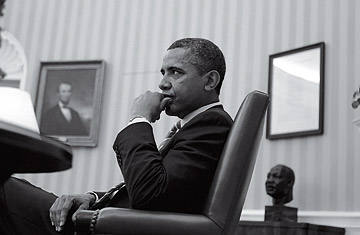
(2 of 7)
Foreign policy is not a popularity contest, but it is historically significant that the Republican Party, which since the Nixon era has enjoyed a clear advantage on foreign policy issues, will enter the 2012 race without any such boost. That may be partly because of the failures of George W. Bush, but it is also because Obama has handled the terrain deftly. And he has done so with a team not of rivals but of heavyweights who could have been difficult to manage. Among the President's core foreign policy advisers for most of his first three years were two people he ran against in the 2008 primary campaign (Hillary Clinton and Joe Biden), a Defense chief inherited from his Republican predecessor (Robert Gates) and a general who is reported to have disagreed with him on Iraq and Afghanistan (David Petraeus). That they mostly agree on broad policy helps, but it is still a team that has worked well together, in some measure because of the understated but highly effective National Security Adviser, Thomas Donilon.
Columnist Walter Lippmann once wrote that "foreign policy consists in bringing into balance, with a comfortable surplus of power in reserve, the nation's commitments and the nation's power." From 2001, the U.S. went though a decade of massive foreign commitments and interventions, which proved enormously expensive in blood and treasure--and highly unpopular around the world. This overextension was followed by an economic crisis that drained American power. The result was a foreign policy that was insolvent. Obama came into office determined to pare down excess commitments, regain goodwill and refocus the U.S. on core missions to achieve a more stable and sustainable global position.
Obama can take credit for having achieved much along these lines. But to leave a more lasting legacy than one of focus, effectiveness and good public diplomacy, he will need to build on his successes and conceive and implement a set of policies that promote a vision of a better world--more stable, more open and more free. Good foreign policy Presidents (like Dwight Eisenhower and George H.W. Bush) managed a complex set of challenges expertly, making few costly errors. Bad ones (like George W. Bush and Lyndon Johnson) made mistakes that cost America in lives, treasure and prestige. But great foreign policy Presidents (like Harry Truman) created enduring structures and relationships that produced lasting peace and prosperity. Obama has been a good foreign policy President; he has the opportunity to become a great one.
The Obama Doctrine
Candidates on the campaign trail usually say about foreign policy what seems politically advantageous, only to discover that they don't actually believe any of it once in office. George W. Bush's only foreign policy statements of note during his campaign were to criticize American arrogance and nation-building. Once he became President, however, as events presented themselves, he realized that he actually liked speaking about America as a nation chosen by God and history to lead the world. And he launched the most extensive nation-building project in U.S. history since Vietnam. Mitt Romney's statements on, say, the Taliban and Iran tell us nothing more than that he has found a place to outflank Obama.
